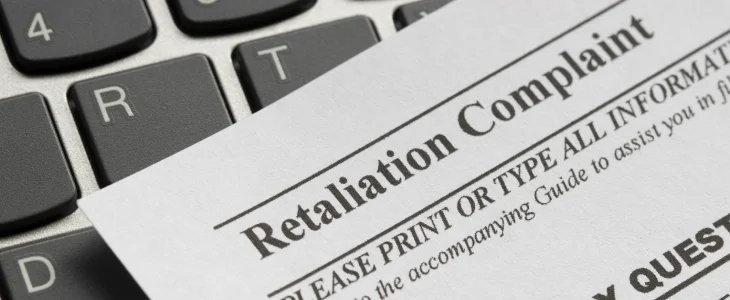Retaliation at work can be stressful and confusing. Whether it’s unfair treatment after reporting an issue or other adverse actions, knowing your rights is crucial. This blog will guide you through recognizing retaliation, the steps you can take, and the protections available. Don’t let retaliation go unchallenged—read on to learn more!
What Is Employment Retaliation?
Retaliation occurs when an employer takes adverse action against an employee for engaging in a legally protected activity, such as reporting discrimination or participating in an investigation. This can include actions such as:
- Demotion
- Termination
- Pay cuts
- Unwarranted disciplinary actions
Retaliation is not limited to direct actions but can manifest more subtly, like being excluded from important meetings or projects. At the same time, not every adverse action is retaliation. For an action to be retaliatory, there must be a direct link between the employee’s protected activity and the employer’s negative response.
The Telltale Signs of Retaliation
While employers have the upper hand when making employment decisions and know how to disguise their retaliatory motives, common indicators of retaliation include:
- Unjustified Poor Performance Reviews: Sudden negative feedback that doesn’t align with your previous evaluations.
- Unexplained Changes in Job Duties: Being reassigned to less favorable tasks or demoted without an apparent reason.
- Exclusion from Opportunities: Being excluded from meetings, projects, or opportunities for advancement.
- Increased Scrutiny: Facing more severe supervision or micromanagement than before.
- Hostile Work Environment: Experiencing verbal or physical harassment, bullying, or intimidation from supervisors or coworkers.
If you notice these signs after engaging in a protected activity, you may be subject to retaliation. To protect yourself and your career, it’s essential to document these incidents and seek legal advice.
Steps To Take After Being Retaliated Against
Taking prompt and strategic action is crucial if you suspect retaliation at work. Here’s what you should do:
- Document Everything: Keep detailed records of all incidents you believe constitute retaliation. Include dates, times, locations, involved parties, and any witnesses. Save copies of relevant emails, memos, and performance reviews.
- Report the Retaliation: Follow your company’s internal procedures for reporting retaliation. This typically involves notifying your HR department or a supervisor. Be clear and specific about your concerns, and request a written acknowledgment of your complaint.
- Seek Legal Advice: Consulting with an experienced employment lawyer can help you understand your rights and options. They can also guide you through internal resolution or legal action.
Taking these steps can strengthen your case and help you pursue justice.
Legal Protections Against Retaliation
Both Connecticut and federal laws provide strong protections against workplace retaliation for employees.
Federal Protections
Under federal law, the Equal Employment Opportunity Commission (EEOC) enforces protections against retaliation under various statutes, including Title VII of the Civil Rights Act, the Americans with Disabilities Act (ADA), and the Age Discrimination in Employment Act (ADEA). These laws prohibit employers from punishing employees for engaging in protected activities, such as filing a discrimination complaint or participating in an investigation.
Connecticut Protections
Connecticut law offers additional protections under the Connecticut Fair Employment Practices Act (CFEPA). This state law prohibits employers from retaliating against employees who report discriminatory practices, file an administrative complaint, or take legal action.
If you face retaliation, an experienced employment lawyer can help you seek justice and potentially recover damages for the harm suffered.
Why You Need a Stratford Retaliation Attorney
Pursuing a retaliation claim against your employer can be complex and intimidating. An experienced attorney can provide invaluable guidance, helping you understand your rights, gather essential evidence, and build a strong case. They can negotiate with your employer or represent you in court to ensure you receive the justice and compensation you deserve.
At Mitchell & Sheahan, we have the expertise to protect your rights and hold your employer accountable. Don’t face workplace retaliation alone—contact us today for a consultation. We’re here to support you every step of the way.
Mitchell & Sheahan, based in Stratford, CT, also serves clients in Fairfield County, New Haven County, Greenwich, Danbury, White Plains, and New York.

